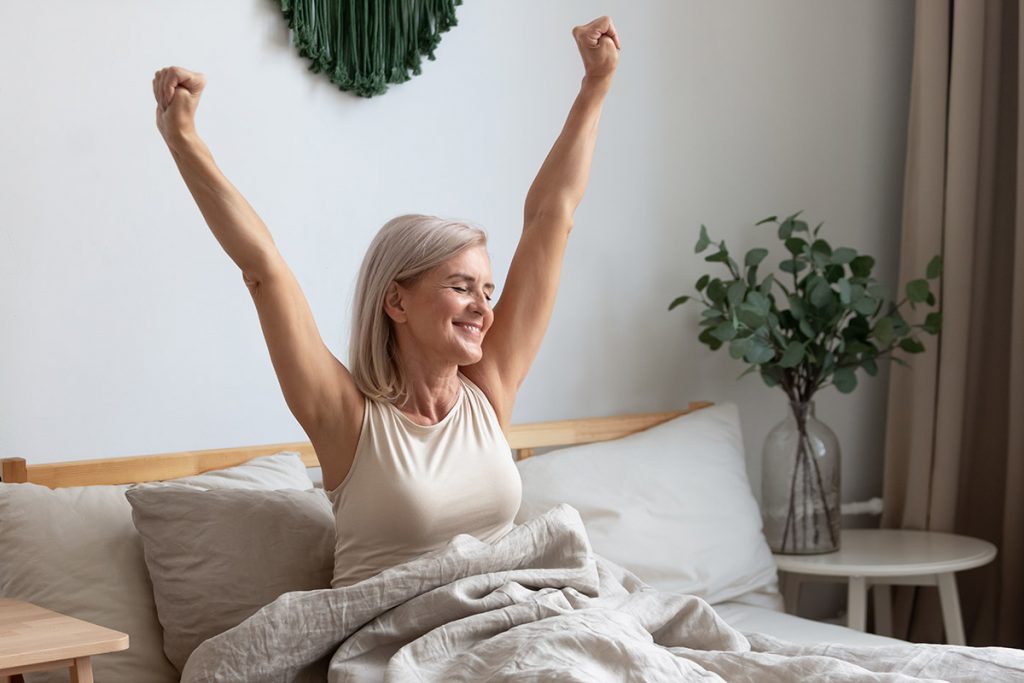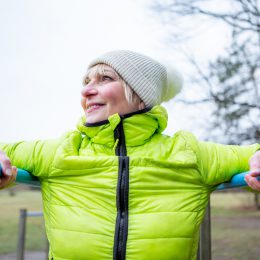¿La mejor medicina? Una buena noche de sueño
Dormir bien es fundamental para gozar de buena salud. Here's why-and how to get the rest your body needs.

Your beauty sleep is more than skin deep. That nightly shut-eye plays a big part in keeping you healthy, happy, and fit.
After all, people who get enough sleep have a lower risk of diabetes and heart disease. They're less likely to be depressed or overweight. Their thinking is sharper and they don't turn into zombies after a night of tossing and turning.
For older adults, poor sleep can be an even bigger problem. It can lead to memory issues, trouble paying attention, and daytime sleepiness. It's even connected to dangerous nighttime falls, according to the American Academy of Sleep Medicine. And it's pretty common. In a recent study of more than 5,000 older adults, 30 percent got less than the recommended seven hours of sleep.
One of the most serious sleep-related concerns? Obstructive sleep apnea. That’s when air coming in through your nose and mouth gets blocked by tissue collapsing in your throat while you sleep.
"When that happens, you don't get as much oxygen as you should," says Michael Hutz, M.D. He specializes in the surgical treatment of sleep apnea at Rush University Medical Center in Chicago. "You have these 'microarousals' all night-many times every hour-where your body wakes you up because you can't breathe. So even if you sleep 10 hours, the quality is bad."
An immediate side effect of sleep apnea is feeling tired the next day. And over the long term, you'll put a strain on your heart and lungs.
"If sleep apnea is left untreated," Dr. Hutz points out, "you may have a hard time controlling high blood pressure and diabetes. Plus, you'll increase your risk for heart attack and stroke."
Some other sleep disorders include:
- Insomnia. That’s the inability to fall asleep or stay asleep. It’s considered chronic if it lasts for more than a month.
- Narcolepsy. That’s when you have episodes of irresistible “sleep attacks” during the day. It might happen even while you’re standing up or moving.
- Restless Legs Syndrome. RLS is a creeping sensation in your lower legs, or aches, pains, and uncontrolled kicking. That can make it hard for you (or your partner) to sleep.
Add SilverSneakers to your wellness routine! Classes and events are happening daily at participating gyms, online through SilverSneakers LIVE, and at community centers near you. Activate your free online account to get started.
The Health Benefits of Sleep
Why is sleep so important? Experts aren't exactly sure.
"It's a scientific mystery," says Adam Sorscher, M.D., director of sleep medicine at Alice Peck Day Memorial Hospital in Lebanon, New Hampshire. "But one theory is that sleep recharges your brain."
When you're awake, Dr. Sorscher explains, your brain uses a ton of adenosine triphosphate, or ATP. It is a high-energy fuel your brain uses to do its work.
"Think of your brain like a charged smartphone," he says. "When you're awake, that charge is running down. And with insomnia, your brain runs out of energy."
Getting enough sleep seems to recharge your brain, Dr. Sorscher says. When that doesn't happen, every part of your health suffers. That's partly because your body releases more cortisol, the stress hormone.
"That's good if you're under attack," Dr. Sorscher says. "But not if it happens chronically."
High levels of cortisol can wreak havoc on your body, he says. Some of its side effects include:
- Higher risk for high blood pressure, heart disease, and stroke
- Vaccinations won’t work as effectively
- Your brain goes on “low-power mode”
- Higher risk for depression, anxiety, and bipolar disorder
"It's a vicious cycle," Dr. Sorscher says. But you can (and should) break that cycle. Esta es la manera.
5 Strategies for Healthy Sleep
Having trouble nodding off? You don't have to suffer.
“Sleep has a profound impact on your quality of life,” says Dr. Hutz. “I’ve seen patients who say they haven’t slept well in 25 years—and after they’re treated, they tell me how they feel so much better.”
You can too. Try these simple (and super-effective) strategies to get the sleep you need.
1. Practice Good Sleep Hygiene
It can really help. Even simple lifestyle tweaks can make a big change in your sleep, including:
- Cutting caffeine in the early afternoon, well before bedtime
- Setting up a regular sleep schedule and try to stick to it
- Getting about 7 to 8 hours of sleep a night
- Keeping your bedroom cool and dark
- Avoiding screens before bedtime
You can also try some soothing sounds. In a recent study from University of Colorado, 86 percent of participants reported that a white noise device helped them fall asleep more easily.
Listening to soothing music at bedtime can help, too. The American Academy of Sleep Medicine says it can lower your heart rate, reduce anxiety, and distract you from stressful thoughts.
Recommended reading: Take the 7-Day Sleep Challenge With SilverSneakers
2. Talk to Your Doctor
Poor sleep is a medical issue, just like a sore throat or a bellyache. Don't hesitate to bring it up with your provider.
After all, says Dr. Sorscher, "We live in a 24-hour culture of wakefulness. Yes, you can exist on 5 hours of sleep. But you might not realize what you're sacrificing."
Start with your primary care provider. They can diagnose and treat some sleep disorders and make suggestions that can help you get more sleep.
They’ll do a physical exam to rule out conditions that can affect sleep, like Parkinson’s disease or stroke. And if they need more information, they may send you to a sleep medicine specialist.
3. Ask About a Sleep Test
If your primary care provider or your specialist thinks you may have sleep apnea, they may recommend a sleep study. That's an overnight test that lets your doctor see what's happening to your brain and body while you're sleeping.
The study will monitor your eye movements, the oxygen levels in your blood, your heart and breathing rates, as well as your snoring and body movements.
There are a couple of different kinds of sleep testing, including:
Polysomnography. At an overnight sleep clinic, a technician will monitor your brain and muscle activity, breathing, movement, and heart rate.
Multiple Sleep Latency Test. This helps your doctor diagnose excessive daytime sleepiness. It measures how quickly you fall asleep and how quickly you enter REM sleep during daytime naps. This is also done in a sleep clinic.
CPAP Titration. If your doctor thinks you may need a CPAP machine to treat sleep apnea, this test figures out the amount of air pressure you need from your CPAP. That helps program your machine just for you. (Or, your doctor might order a split-night study. You’ll have polysomnography to check for sleep apnea during the first half of the night. Then you’ll have CPAP titration during the second half of the night.)
Suscríbase a nuestro boletín informativo
Es rápido y fácil: Usted podría estar entre las 13 millones de personas elegibles.
¿Ya es miembro? Haga clic para descubrir nuestros más de 15,000 centros participantes.
Síganos
Home Sleep Apnea Testing. You can stay in the comfort of your own bed for this test. You’ll wear devices that collect data about your breathing and heart rate. It’s more convenient, but there’s a downside. Home testing provides less information than in-lab testing.
4. Get Treatment
If it turns out you've got sleep apnea, don't panic. According to the American Sleep Apnea Association, at least 25 million Americans have the condition. And there are lots of effective treatments.
CPAP. This device has been around for about 50 years. That’s because it works so well. “It’s the first line for sleep apnea treatment,” Dr. Hutz says. “It blows a continuous column of air into your throat to keep it from collapsing.” It can be very effective, but up to 50 percent of people have a hard time tolerating it.
Dental devices. If you have mild to moderate apnea, your dentist can make you mouthpiece that holds your lower jaw forward. That prevents your airway from collapsing and stopping your breathing.
Surgery. There are lots of surgical options to treat sleep apnea, including neural stimulation. “It’s a low-risk, outpatient procedure where a device is implanted above your breast on the right side,” says Dr. Hutz. “It acts like a pacemaker for your tongue.”
The device, called Inspire, has a little sensor connected to the nerve that controls your tongue. That moves your tongue forward every time you take a breath to keep your throat from collapsing while you sleep. It works about 80 percent of the time in the right patient-more commonly, those over age 45 who aren't significantly overweight, says Dr. Hutz.
Other surgical options: Your doctor can remove your tonsils and other soft tissue in the back of your throat. Or you can have maxillomandibular advancement surgery. That widens your upper jaw or moves both your upper and lower jaws forward to open up your airway.
“This type of surgery is about 85 to 90 percent effective,” says Dr. Hutz.
Talk to your doctor to figure out which treatments may work for you.
5. Try Therapy
Cognitive behavioral therapy for insomnia (CBT-I) is a kind of talk therapy. It involves working with a provider to identify the things that are keeping you from falling asleep. Whether it’s your racing thoughts or too much caffeine, your therapist will help you find new behaviors that can help.
"CBT-I is the most effective treatment for insomnia," says Dr. Sorscher. Studies show it's more effective than medication. It can even cut the risk of depression by more than 50 percent in people who suffer from insomnia.
No time for therapy appointments? No worries. One study shows that internet therapy sessions can be just as effective.
See our sources:
Link between sleep habits and chronic disease: Centers for Disease Control and Prevention
Dangers of poor sleep habits in older adults: American Academy of Sleep Medicine
Overview of sleep disorders: Centers for Disease Control and Prevention
Tips for better sleep: Centers for Disease Control and Prevention
Study on how white noise can improve sleep: University of Colorado
How music helps you sleep better: American Academy of Sleep Medicine
Overview of sleep studies: Sleep Foundation
How CBT-I helps treat insomnia: Evidence-Based Complementary and Alternative Medicine
Link between insomnia and depression: JAMA Psychiatry
Effectiveness of online therapy for insomnia treatment: Sleep
Activate Your FREE SilverSneakers Online Account
Get hundreds of free SilverSneakers On-Demand videos and stay in touch with us by creating your free online account. You don’t have to be a SilverSneakers member to get on-demand workout videos, health and fitness tips from SilverSneakers, and more.
SilverSneakers members can go to thousands of nationwide gyms and fitness locations, plus take SilverSneakers LIVE online classes led by specially trained instructors and designed for all fitness levels and abilities – at no additional cost. If you have a Medicare Advantage plan, it may include SilverSneakers. Check your eligibility here.
Already a member? Get your SilverSneakers member ID, search for locations near you, and all the health and wellness resources you need by logging in to your online member account here.





